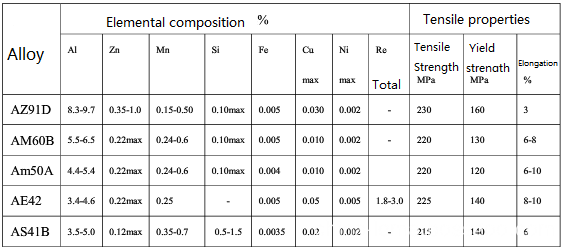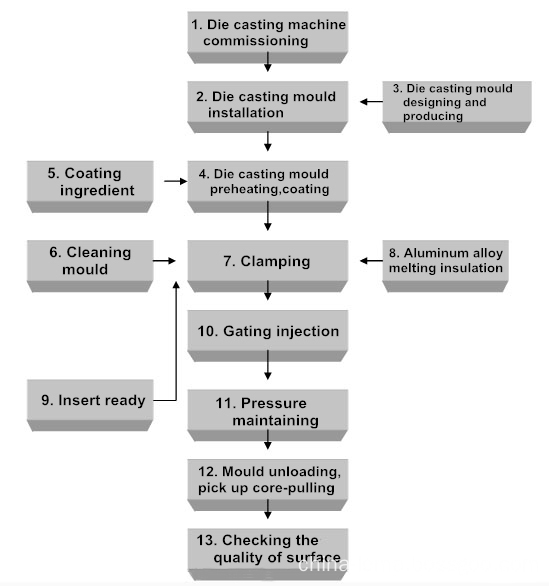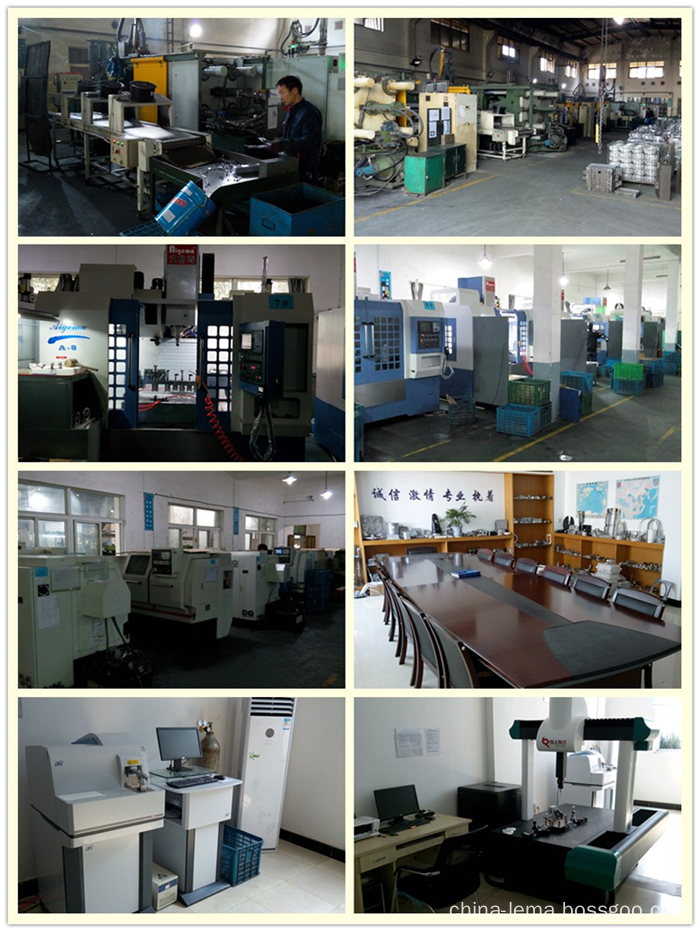The content of silver in the earth's crust is very small, only 1 × 10 -5 %. In nature, silver is present as a single natural silver, but mainly in the form of a compound. The main mineral of silver is argentite (Ag 2 S), sulfur and copper silver (AgCuS), antimonial silver (3Ag 2 S · Sb 2 S 3), silver sulfur arsenic (3Ag 2 S · As 2 S 3 ), chlorargyrite (AgCl), silver bromo-chloride (AgCl · AgBr) gold silver and tellurium and the like. Silver minerals are often symbiotic with sulfide minerals of colored heavy metals such as copper, lead and zinc , and have a comprehensive recovery value. Natural silver is mostly fine, and large ones are rare. According to reports: in 1875, a natural gold block weighing 5000kg was found in a mine 300m deep underground. Chile has also found 1420kg of flake-shaped natural silver.
Now every country optimistic about the prospect of the magnesium alloy die castings,especially in auto,aviation,telecom,transportation and mechanical industry,
which adopt to use magnesium alloy die casting to replace steel casting for reducing weight effectively and then can save energy and reduce environment pollution.
The car can decrease 0.4L oil consumption per kilometer if it can relieve every 100KGS. So America,Japan and European countries have enlarge use of magnesium alloy Die Casting Parts, for example, steering wheel, instrument panel, seat skeleton, crankcase, gearbox shell, wheel hub and so on.
So magnesium alloy die castings grows at 20%~30% a year, 80% of them are die casting parts.
Meanwhile magnesium alloy die castings expand use in appliance light industry and daily hardware, such as notebook shell, VCR box,
mobile phone, power tool shell,camera shell, upholstery, mower shell etc. These magnesium alloy die casting parts with a series of advantages, not only greatly reduce weight, but also have the precise & steady dimension and smooth finish surface.
Die-cast magnesium alloy material:
material tightness, thermal effects during solidification, resistant to electricity chemical corrosion resistance capabilities.
to prevent oxidation reaction to proceed, so magnesium alloy flammable or explosive. Magnesium alloy is also easy to dissolve other metals, including magnesium
alloy severely reduce the ability of anti-electrochemical corrosion of nickel, copper and other elements. In addition, the same volume of liquid aluminum and magnesium alloy during solidification.
Magnesium alloy heat release was significantly lower than aluminum.
Magnesium alloy chemical elements:
Magnesium alloy commonly used alloying elements are aluminum and zinc. Alloying of aluminum alloy can improve the strength and casting properties. Zinc can also improve the performance of the alloy casting. In order to
ensure the casting performance, the aluminum content should be more than 3% in the die casting magnesium alloy, zinc content is less than 2%. Otherwise it is easy to
produce crack.
The commonly
used magnesium alloy die-casting material
Common cold chamber die casting machine injection parts must be improved
to meet the needs of the magnesium alloy die casting production as follows:
1)
Fast injection speed increased from 4~5m/s to
6~10m/s.
2)
Reduce the time of supercharging and build pressure.
3)
Improve the injection speed and injection force
control.
4)
Equipped with a special furnace protection gas
device
The aluminum die
casting part production flow chart
Commonly used materials of magnesium alloy die casting: ADC12, ZL101,
ZL102,A380, AlSi9Cu3, AlSi12(Fe);
The precision of the magnesium die casting: ±0.1mm;
Smoothness of surface of rough part: Ra1.6~Ra3.2;
Shrinkage rate of Mg alloy die casting products: 0.5%;
Material wastage rate: 5%;
General magnesium die-casting machining allowance: 0.5mm~0.7mm;
Surface preparation methods: Sand blasted, Shot blasting, Powder coating,
Painting, Plating, Electrophoresis, Polishing
Our company's magnesium alloy die casting production equipment and management system
Aluminum Die casting production equipment: L.K brand die casting machine From 160T, 200T,
280T, 400T, 630T, 800T and 1250T;
CNC machining center: 8 sets;
CNC lathe machine: 6 Guangzhou Machines and 7 Shenyang Machines;
Work days of one week: From Monday to Saturday;
Shift work: 2 shift per day;
Working
hours: From AM 8:00 to PM 5:00;
2D and 3D
drawing Software: AutoCAD, UG, Pro/E, SolidWorks 2013;
QC control: New type NANO CMM, FPI M5000
desktop metal analyzer, Easson projector, Mechanical properties tester.
The production of Magnesium die casting and QC control
Magnesium Die Casting Part, Magnesium Alloy Die Casting Part, Magnesium Die-Casting Product, Magnesium Injection Part NINGBO BEILUN LEMA MACHINERY TECHNOLOGY CO.,LTD , http://www.china-lema.com
Magnesium and aluminum have big differences in the chemical, physical properties, mainly in terms of chemical reactivity, surface oxidation of the liquid metal
Magnesium has a strong chemical reactivity than aluminum and the metal bath surface can not be formed as dense as molten aluminum alloy oxide protective film
Mechanical properties of pure magnesium is very poor, can not meet the requirements of industrial parts of the yield strength and tensile strength. By adding alloying elements can significantly improve the mechanical properties of magnesium, the magnesium alloy`s strength to weight than the titanium alloy in all kinds of alloying and ranked second, open up broad prospects for its application.
The effect of alloying element second is to improve the performance of magnesium alloy casting. Pure magnesium have high melting point, poor mobility, high shrinkage.
By alloying can reduce the temperature of the liquid, increase liquidity. According to the characteristics of magnesium alloy decreased significantly at temperature above 150degrees Celsius and the strength of the alloy,
the third role is to enhance the creep resistance of magnesium alloy.


